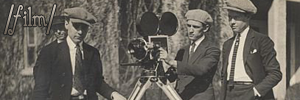>>13847
>Buñuel
There's no better thread for it, so here's a list of films he liked:
Paths of Glory, Roma, Battleship Potyomkin, La grande abbuffata, Goupi Mains Rouges, Jeux interdits, early films of Fritz Lang, Buster Keaton and Marx Brothers, Rękopis znaleziony w Saragossie, pre-war Renoir's films, Persona, La strada, Le notti di Cabiria, La dolce vita, Sciuscià, Ladri di biciclette, Umberto D. (daily reminder that de Sica is retarded american, literal retard), von Stroheim's, Sternberg's(Underworld) and Wajda's films, Manon, L'Atalante, Dead of Night, White Shadows in the South Seas, Portrait of Jennie, The Treasure of the Sierra Madre, La caza and La prima Angélica (he likes Saura overall, aragonian as well)
and disliked:
Il Casanova di Federico Fellini, From Here to Eternity, Roma città aperta and Romance sentimentale (the second one is worse than the first, seems impossible, I know)
He actually hates Dos Passos, Hemingway and Steinbeck too, for which I like him very much, overrated rubbish, rubbish. But, in the end, he himself is overrated as fuck, put on piedestal by brainlets and retards like Gustavo Alatriste who saw Viridiana six times and then shout "I finally get it!". All clueless, brainless demystifiers and explainers should be shot dead. And tbh, saw Tristana recently, really, he's no surrealist(at least his second french period totally isn't), just like in Viridiana, blunt, stupid symbolism, beating the shit out of my eyes, that would be nothing but his films are that, should be that, should've been that, when you take that away, you get lacking, boring camera, like the mexanon already said, cheap props, hasty, or, rather, no production, way better done herzog-esque bullshit, self-injection of his (based) opinions into each and every character (I don't know why he didn't like Borges honestly, saying he's complacent and arrogant, like, I don't like him too, but for other reasons) and "ohmagd sodep shtyrslf" feeling, but that one he sure has done on purpose to hide himself and get cheap laughs, and good stories, sometimes. That said, I like him very much, he's very comfy to watch (Tristana with its brownish pallete is as comfy as it gePost too long. Click here to view the full text.
